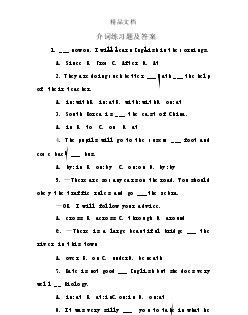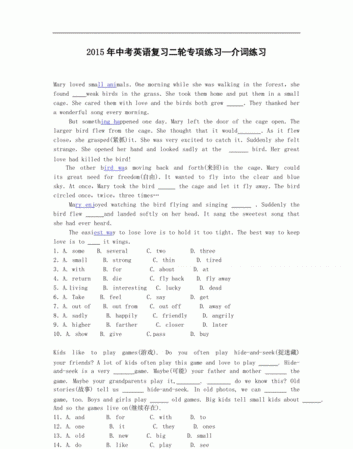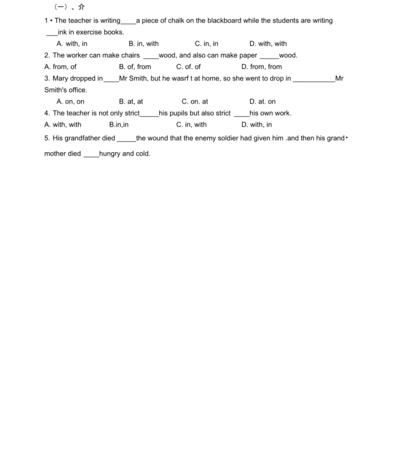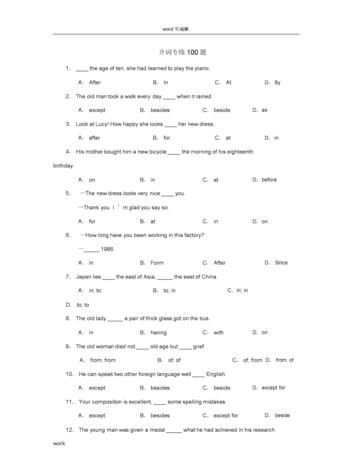本文目录
英语填介词的做题方法
1.If you walk along this market,you will find the square on your right.
2.the mountain which is covered with snow looks wonderful
3.these old pictures always remind me of my happy childhood
5.“why do you keep fixing your eyes _on me?” the girl said angrily to the man.
6.after he had failed so many times, he hanged himself _in despair
7.Everybody did well in the exam except Jim. He never listens to the teacher in class.
有不会的可以再问我

初中英语易错题
.– What can I do for you? -- I’d like two _______.
A. box of appleB. boxes of applesC. box of applesD. boxes of apple
答案: B. (选择其它三项的同学要注意仔细看题.不要马虎, 这里box 和apple都是可数名词)
2.Help yourself to _________.
A. some chickensB. a chickenC. some chickenD. any chicken
答案: C (选择A的同学要注意chicken当鸡肉讲时不可数)
3..________ it is today!
A. What fine weatherB. What a fine weatherC. How a fine weatherD. How fine a weather
答案: A. (选择B的同学要注意weather不可数. 选择C和D的同学要注意weather是名词, 要用what来感叹.)
4.Which is the way to the __________?
A. shoe factoryB. shoes factoryC. shoe’s factoryD. shoes’ factory
答案: A. (选择D的同学注意这里不是指名词所有格, 而是名词作形容词的用法.类似的用法如: pencil box; school bag等.)
5.This class ______ now. Miss Gao teaches them.
A. are studyingB. is studyingC. be studyingD. studying
答案: A. (选择B的同学要注意, 当这种概念名词当 “人”讲的时候要做复数处理.类似的还有: the police are running after the thief等)
6.We will have a _______holiday after the exam.
A. two monthB. two-monthC. two month’sD. two-months
答案: B (选择C的同学要注意应用two months’; 选择D的同学要注意名词之间有 “— ” 后的组合词当作形容词来用, 因此就不用所有格形式了.)
7.____trees are cut down in the forests every year.
A. ThousandB. ThousandsC. Thousand ofD. Thousands of
答案: D. (选择C的同学注意词组记忆的准确性)
8.Our sports meeting will be held ________.
A. on 24, Tuesday, April B. in April 24, TuesdayC. on Tuesday, April 24D. in April Tuesday 24
答案: C. (选B的同学是受到中文的影响,要特别注意中英文的差异)
9_________ people here are very friendly to us.
A. The B. / C. A D. An
答案: A. (选择B的同学要注意这里的people是特指这里的, 因此要用定冠词the)
10..There is no enough ________ in the corner to put the table.
A. placeB. roomC. floorD. ground
答案:B (根据句意知道,这里表示没有地方放桌子。选A的同学要注意place表示地点,是可数名词)
二、代词
11.Some people like to stay at home, but ________ like to go to the cinema.
A. anotherB. otherC. othersD. other one
答案: C. (选择B的同学要牢记: some…., others….)
12.-- Is this your shoe? -- Yes, but where is _________?
A. the other oneB. other oneC. another oneD. the others
答案: A. (选择C的同学要注意鞋是两只, another指的是三者或者三者以上)
13.– When shall we meet again next week?
-- ______day is possible. It’s no problem with me.
A. EitherB. NeitherC. EveryD. Any
答案: D. (选择C的同学要注意every指的是每一天都见面, any指的是任何一天都可以.注意中文的干扰)
14.Have you ever seen _______big panda before?
A. a suchB. such aC. so aD. a so
答案: B (选择A的同学要注意词组记忆的准确性)
15.-- _______ do you write to your parents?
-- Once a month.
A. How longB. How soonC. How oftenD. How far
答案: C. ( 选择A的同学要注意中文的干扰. 由回答知道这里指的是写信的频率, 用how often表示.)
16.Robert has gone to _____ city and he’ll be back in a week.
A. otherB. the otherC. anotherD. any other
答案:C (选择其它三项的同学要注意,这里没有说只有两座城市,因此不能用.)
17.– A latest magazine, please.
-- Only one left. Would you like to have ________?
A. itB. oneC. thisD. that
答案:A (选择B的同学要注意这里指的是上一句中提到的那本杂志,不能用表示泛指的不定代词one )
18.– Which book would you like to borrow?
-- ________ of the two books is OK with me.
A. EitherB. BothC. AnyD. None
答案:A (选择B的同学要注意is 表示单数.)
19.He knows _________ English ________ French. But he’s very good at Japanese.
A. either; orB. both; andC. neither; norD. either; nor
答案:C (选择A和B的同学要注意语境.)
20.– What do your parents do?
-- One is a teacher; _________ is a driver.
A. otherB. anotherC. the otherD. that one
答案: C (选择其它三个选项的同学要注意, one is …, the other is …的用法)
21.Mrs. Lee teaches ________ math. We all like her.
A. weB. usC. ourD. ours
答案: B (选择C的同学要注意, teach +人+科目, 而不能用teach +某人的+ 科目)
22.There are many trees on ________ side of the street.
A. eitherB. anyC. allD. both
答案:A (选择D的同学要注意side为单数。选择B的同学要注意:街道只有两边,因此不能用any)
23.________ is the population of the city?
A. How many B. What C. How many peopleD. How much
答案:B (在问到人口是多少时,其实是在说“人口数是什么”,因此不能用A,要注意排除中文的干扰。)
三、介词、连词
24.Japan is ________ the east of China. A. inB. toC. onD. at
答案: B ( in 表示在范围里的, on表示紧挨着的; to 表示在范围以外的)
25.The postman shouted, “ Mr Green, here is a letter ________ you.”
A. to B. fromC. forD. of
答案: C ( 选择A的同学要注意to 表示动作的方向, for表示有从属关系或者利益关系)
26.We can’t do it ________ your help.
A. withB. ofC. underD. without
答案: D. (选择C的同学要注意中文的干扰, 借助某人的帮助要用with,反之用without)
27.He hasn’t heard from his friend __________ last month.
A. sinceB. by the end ofC. forD. until
答案: A (选择B的同学要注意B选项为过去完成时的时间;选择C的同学要注意, for+时间段; 选择D的同学要注意不是not…until 句型.until + 句子)
28.I didn’t buy the dictionary yesterday _________ my aunt would give me one.
A. untilB. becauseC. ifD. before 答案: B (选择A的同学要注意语境)
29.I’m going to look for another job ________ the company offers me more money.
A. afterB. unlessC. whenD. for
答案: B ( 选择其它三项的同学要注意语境, 这里是指除非公司给我更多工资,否则我就要找其它工作.)
30.Don’t hurry. The bus won’t start ______everybody gets on.
A. sinceB. asC. untilD. when
答案: C (选择D的同学要注意前面是否定.)
31.Please show me _________ to send an e-mail, John. It’s the first time for me to do it.
A. howB. whatC. whenD. where
答案:A (选择C的同学要注意认真看题,这里的time不是时间,而是指第一次)
32.You’ve passed the exam. I’m happy ______ you.
A. onB. atC. inD. for
答案:D (选择A的同学要注意记忆词组的准确性.)
33.I wonder ________ they finished so many different jobs in such a short time.
A. whyB. howC. whenD. where
答案:B (选择A的同学要注意语境,这里指他们怎么能在如此短的时间里完成如此多的困难的工作.)
34.-- Do you speak English?
-- Yes, I speak __a little English ___ some French.
A. neither, notB. both, orC. either, orD. not only, but also
答案:D (选择C的同学要注意语境.)
35.______ the maths problem is difficult, I’ll try very hard to work it out.
A. ThoughB. WhenC. BeforeD. After
答案:A (选择B的同学要注意语境.不能说当题目难的时候,我将努力.而是说尽管题目难,但我将努力解决.)
36.The accident took place ________ a cold February evening.
A. onB. inC. atD. for
答案:A (选择B的同学要注意,在特指的早上、下午、晚上,不用in要用on)
37.He turned ________ the radio because his father was asleep.
A. onB. downC. upD. over
答案:B (根据语境:他爸爸睡着了,因此不能用A-打开,也不能用C-调大.D表示反过来)
38.I don’t know the homework _______ today.
A. onB. inC. ofD. for
答案:D (选择C的同学要注意of表示从属关系,要注意中文的干扰.)
39.– Oh, it’s raining heavily.
-- Please don’t leave ________ it stops.
A. whenB. afterC. sinceD. until
答案: D (选择其它选项的同学要注意读懂句子, 只有把语境搞清楚才能答对问题.)
40.Jane said she would come here ________ 9:00 and 9:30 tomorrow morning.
A. fromB. atC. betweenD. around
答案: C (选择B的同学没有把体看完整; 选择A的同学没有注意到from…to…的搭配.)
四、动词
41.My father went to Shanghai yesterday. He ______ back in two weeks.
A. comesB. has comeC. will comeD. came
答案: C ( 选择D的同学要注意in +时间段, 表示在未来的一段时间,应用将来时)
42..It’s spring now. The students _______ trees these weeks.
A. plantB. are plantingC. will plantD. planted
答案: B (选择A的同学要注意 these weeks 并不表示经常做某事,而是强调这几个星期同学们一直在种树.)
43..-- __________ you ________ your book to the library?
-- Yes. I returned it yesterday.
A. Did, returnB. Have, returnedC. Will, returnD. Do, return
答案: B ( 选择A的同学过分注意回答用了一般过去时, 但在上一句中, 并没有给出过去的时间,强调你现在是否还书了, 应用现在完成时.)
44.– Must I finish it now? -- No, you ________.
A. mustn’tB. needn’tC. can’tD. shouldn’t
答案: B (选择A的同学要注意mustn’t意思指不允许, needn’t指的是不必要.)
45..Though it’s cloudy now, it _________ get sunny later.
A. can B. mayC. mustD. need
答案: B ( 选C的同学要注意语境, 这里强调过些时候也许会晴天, 表示推测性.)
46.It is in the library, you _______ talk loudly.
A. may notB. can’tC. needn’tD. mustn’t
答案: D ( 选择B的同学要注意中文的干扰.can’t表示不能够。)
47..If anyone wants to say something in class, you ________ put up your hands first.
A. mustB. mayC. shouldD. can
答案: A ( 选其他三个选项的同学要注意语境,anyone暗示出语气。表明是一个规定,而不是建议。)
48.– I called you last night but no one answered the phone.
-- I ______ dinner with my friends in the restaurant.
A. haveB. hadC. was havingD. have had
答案:C (选择B和D的同学要注意分析语境.这里指我当时正在和朋友在饭馆吃饭.)
49..If you have lost a library book, you have to _________ it.
A. find outB. look afterC. pay forD. take care
答案:C (选择A的同学要注意语境)
50..He will call me as soon as he _______ the city.
A. reachesB. reachedC. will reachD. is reaching
答案:A (选择B的同学要注意主将从先)
51.The pen _________ him ten yuan.
A. paidB. costC. tookD. spent
答案:B (选择C的同学要注意took通常用在时间上;选择A和D的同学要注意,这里的主语是物品,因此不能用paid 和spent)
52..The train _________ for twenty minutes.
A. leftB. has leftC. is leavingD. has been away
答案:D (选择B的同学要注意,当用完成时表示持续动作时,要选择可持续动词,不要用瞬间动词.)
53..– How many books _____ they ________?
-- Five. But they haven’t finished reading even one.
A. did…borrowB. had…borrowedC. will…borrowD. do…borrow
答案:A (选择B的同学要注意,这里只是问过去发生的一件事,并不是过去时间之前发生的.)
54.He _________ his bike so he has to walk there.
A. lostB. has lostC. had lostD. loses
答案:B (选择A的同学注意句子并没出现两个时间点,因此要注意时态的前后一致.)
55.– Why did the policeman stop us?
-- He told us not _______ so fast in this street.
A. driveB. drivingC. to driveD. drove
答案:C (这里考查的是tell sb. not to do sth.)
五、形容词、副词
56.The population of the world in 20th century became very much _________ than that in 19th.
A. bigger B. larger C. greater D. more
答案: B.(选择其它三项的同学要注意population的固定搭配是large)
57.Miss Li is one of _______ in our school.
A. a popular teacherB. more popular teacherC. most popular teacherD. the most popular teachers
答案:D.(选择其它三项的同学要注意one of + 复数的用法.)
58.The magazines are ________ easy that the children can read them well.
A. suchB. soC. tooD. very
答案: B (选择A的同学要注意easy是形容词,要用so…that, 而不用such…that)
59.– Would you like ________ more tea?
-- Thank you. I’ve had ________.
A. any, muchB. some, enoughC. some, muchD. any, enough
答案:C (选择B的同学要注意enough是形容词, 不能说had enough)
60.I think basketball is _______. I like to watch it.
A. boringB. boredC. excitingD. excited
答案:C (选择D的同学要注意basketball本身很令人激动,excited表示被什么所感染而激动。)
61.This dinner looks _______ to me, and I like it.
A. terribleB. goodC. badlyD. nicely
答案:B (选择D的同学要注意look在这里是系动词,后面要加形容词。)
62.The math problem is so hard that ________ students can work it out.
A. a fewB. a littleC. manyD. few
答案:D (选择A、C的同学要注意语境,这里指没有什么学生能做出来。)
63.– What’s the weather like tomorrow?
-- The radio says it is going to be even ______.
A. badB. worstC. badlyD. worse
答案:D (选择A的同学要注意,even+比较级)
64.Though she talks ______, she has made ____ friends here.
A. a little, a fewB. little, fewC. little, a fewD. few, a few
答案:C (选择A的同学要注意语境,这里指虽然她不怎么说话,但她有一些朋友.)
65.He never does his work _______ Mary.
A. as careful asB. so careful asC. as carefully asD. carefully as
答案:C (选择A和B的同学要注意work 是行为动词,要用副词来修饰.)
六、句法
66..If it ________ tomorrow we’ll go to the park.
A. will not rainB. doesn’t rainC. is not rainingD. didn’t rain
答案: B (选择A的同学要注意if引导的条件状语从句主句用将来时, 从句用一般现在时.)
67.The radio says the snow ______ late in the day.
A. stopsB. will stopC. has stoppedD. stopped
答案: B. (选择A的同学要注意语境, late in the day表示 “晚些时候”, 要用将来时)
68.The nurse told the children the sun ______ in the east.
A. risesB. roseC. will riseD. has risen
答案: A ( 选择B的同学要注意, 虽然主句中用了told, 但太阳从东方升起是真理性事实, 应用一般现在时表示.)
69.– Are you sure you have to? It’s been very late.
-- I don’t know ______ I can do it if not now.
A. whereB. whyC. whenD. how
答案: C ( 选择D的同学要注意语境, 根据语境知道这里强调的是必须先在做,否则就没有时间了)
70.- Could you tell me _______ she is looking for?
-- Her cousin, Susan.
A. thatB. whoseC. whomD. which
答案: C (选择其它三项的同学要注意语境,这里是指找Susan这个人)
71.– When are the Shutes leaving for New York?
-- Pardon? -- I asked ___________.
A.when are the Shutes leaving for New York
B.when the Shutes are leaving for New York
C.when were the Shutes leaving for New York
D.when the Shutes were leaving for New York
答案: D ( 选择B的同学注意到了宾语从句的语序,但同时要注意时态要用相应的过去时.)
72.Would you please tell me ________ next, Mr Wang?
A. what should we doB. we should do whatC. what we should doD. should do what
答案: C ( 选择A的同学要注意宾语从句的语序为陈述语序.)

介词填空
介词用法口诀
雨叶
早、午、晚要用in,at黎明、午夜、点与分。
年、月、年月、季节、周,阳光、灯、影、衣、冒in。
将来时态in...以后,小处at大处in。
有形with无形by,语言、单位、材料in。
特征、方面与方式,心情成语惯用in。
介词at和to表方向,攻击、位置、恶、善分。
日子、日期、年月日,星期加上早、午、晚,
收音、农场、值日on,关于、基础、靠、著论。
着、罢、出售、偷、公、假,故意、支付、相反,准。
特定时日和"一……就",on后常接动名词。
年、月、日加早、午、晚,of之前on代in。
步行、驴、马、玩笑on,cab,carriage则用in。
at山脚、门口、在当前,速、温、日落、价、核心。
工具、和、同随with,具有、独立、就、原因。
就……来说宾译主,对、有、方状、表细分。
海、陆、空、车、偶、被by,单数、人类know to man。
this、that、tomorrow,yesterday,next、last、one。
接年、月、季、星期、周,介词省略已习惯。
over、under正上下,above、below则不然,
若与数量词连用,混合使用亦无关。'
beyond超出、无、不能,against靠着,对与反。
besides,except分内外,among之内along沿。
同类比较except,加for异类记心间。
原状because of,、 owing to、 due to表语形容词
under后接修、建中,of、from物、化分。
before、after表一点, ago、later表一段。
before能接完成时,ago过去极有限。
since以来during间,since时态多变换。
与之相比beside,除了last but one。
复不定for、找、价、原,对、给、段、去、为、作、赞。
快到、对、向towards,工、学、军、城、北、上、南。
but for否定用虚拟,复合介词待后言。
ing型由于鉴,除了除外与包合。
之后、关于、在......方面,有关介词须记全。
in内to外表位置,山、水、国界to在前。
如大体掌握如上介调用法口诀,就不易出错。当然,至于介词的详尽用法,同形词又是连词及副词等内容此章不讲。下面对该口诀分别举例帮助你理解消化。
早、午、晚要用in
例:in the morning 在早上
in the afternoon 在下午
in the evening 在晚上
in the day 在白天
at黎明、午、夜、点与分
例: at dawn, at daybreak 在黎明时候
at noon 在中午
at night 在夜间
at midnight 在午夜
以上短语都不用冠词
at six o'clock 在6点钟
at 7:30 (seven thirty) 在7点半
at half past eleven 在11点半
at nine fifteen 在9点15分
at ten thirty a.m. 在上午10点30分
也可以写成
seven to five 5点差7分(半小时以上)
five minutes after two 2点过5分
at a quarter to two 1点45分
at the weekend 在周末
年、月、年月、季节、周
即在"来年",在"某月",在"某年某月" (但在某年某月某
日则用on),在四季,在第几周等都要用in。
例;in 1986 在1986年
in 1927 在1927年
in April 在四月
in March 在三月
in December 1986 1986年12月
in July l983 1983年7月
in spring 在春季 in summer 在夏季
in autumn 在秋季 in winter 在冬季
in the fist week of this semester 这学期的第一周
in the third week 在第三周
阳光、灯、影、衣、冒 in,
即在阳光下,在灯下,在树阴下,穿衣、着装、冒雨等都要用in。
例:Don't read in dim light. 切勿在暗淡的灯光下看书。
They are reviewing their lessons in the bright light. 他们在明亮的灯光下复习功课。
They are sitting in the shade of a tree. 他们坐在树阴下乘凉。
a prisoner in irons 带着镣铐的囚犯
He went in the rain to meet me at the station. 他冒雨到车站去接我。
The poor dressed (clothed) in rags in old society. 旧社会穷人们衣衫褴褛.
以及:in the bright sunlight 在明亮的阳光下
a merchant in disguise 乔装的商人
the woman in white (black, red, yellow) 穿着白(黑、红、黄)色衣服的妇女
in uniform 穿着制服
in mourning 穿着丧服
in brown shoes 穿着棕色鞋
in his shirt sleeves 穿着衬衫
将来时态in...以后
例: They will come back in 10 days. 他们将10天以后回来。
I'll come round in a day or two. 我一两天就回来。
We'll be back in no time. 我们一会儿就回来。
Come and see me in two days' time. 两天后来看我。(从现在开始)
after... (从过去开始)
小处at大处in
例:Li and I arrived at Heishan county safe and sound, all is well. Don't worry. 李和我平安地到达黑山县,一切很好,勿念。
I live in a great city (big city), my sister lives at a small town while my parents live at a village. 我住在大城市,我姐姐住在一个小城镇,而我的父母则住在农村。
I'm in Liaoning, at Anshan. 我住在辽宁省鞍山市.
有形with无形by,语言 、单位、材料in
例:The workers are paving a road with stone. 工人们正用石子铺路。(有形)
The teacher is correcting the paper with a new pen. 这位教师正用一支新笔批改论文。(有形)
"Taking Tiger Mountain by Strategy" is a good opera. <<智取威虎山>>是-出好戏。(无形)
The product is separated by distilation into gasoline and gas oil. 这种产品是用蒸馏分离出气油和粗柴油。 (表示方式、手段、方法--无形)
I really can't express my idea in English freely in-deed. 我确实不能用英语流利地表达我的思想。 (表示某种语言用in)
I wrote a novel in Russian. 我用俄语写了一本小说。(同上)
The kilometer is the biggest unit of length in the metric system. 公里是米制中最长的长度单位。 (表示度、量、衡单位的用in )
The length is measured in meter, kilometre, and centimetre. 长度是以米、公里、厘米为单位来计算的。(同上)
This board was cast in bronze not in gold. 这个牌匾是铜铸的,不是金铸的。
特征、方面与方式、心情、成语惯用in
特征或状态:
例: The Democratic Party was then in power. 那时民主党执政。
They found the patient in a coma. 他们发现病人处于昏迷状态。
He has not been in good health for some years. 他几年来身体一直不好。
Many who came in despair went away in hope. 许多人带着绝望情绪而来,却满怀希望而去。
The house was in ruins. 这房屋成了废墟。
The poor girl was in tears. 这个贫苦女孩泪流满面。
Her clothes were in rags. 她的衣跟穿破了。
His shoes were in holes. 他的鞋穿出窟窿了。
I only said it in fun. 我说这话只是开玩笑的。
She spoke in grief rather than in anger. 与其说她讲得很气愤,不如说她讲得很伤心。
还有一些短语也用in,如:
in jest 诙谐地,in joke 开玩笑地,in spite 恶意地, in fairness 公正地,in revenge 报复, in mercy 宽大,in sorrow 伤心地等。
His mind was in great confusion. 他脑子里很乱。
Today everybody is in high spirits and no one is in low ebb. 今天大家都兴高采烈,没有一个情绪低落的。
She and her classmates are in flower ages. 她和她的同学都正值妙龄。
The compaign was in full swing. 运动正值高潮中。
方面:
例:we accepted the item in principle. 我们在原则上接受了这个条款。
They are never backward in giving their views. 他们从来不怕发表自己的意见。
The backward area has achieved self-sufficient in grain. 这个落后的地区在粮食方面已能自给。
A good teacher must be an example in study. 一个好的教师必须是学习的模范。
方式:
例:All the speeches were taken down in shorthand. 所有报告都用速记记录下来了。
The Party has always educated us in the spirit of patriotism and internationalism. 党一贯以爱国主义和国际主义精神教育我们。
如下成语惯用in
例如: in all 总计
in advance 事前
in the meantime 与此同时
in place 适当地
in hopes of(或in the hope of) 怀着.......希望
in connection with 和……有关
in contact with 和……联系
in addition to 除......以外
in case of 倘若,万一
in conflict with 和......冲突
in force 有效的,大批
in depth 彻底地
in regard to 关于
in the neighborhood of 大约、邻近
in retrospect 回顾,一想起
in behalf of 代表......利益
in the least 一点,丝毫
in alarm 惊慌、担心
in the opinion of 据……见解
in the long run 从长远说来
in one's opinion 在……看来
in word 口头上
in a word 总之
in vain 无益地, 白白地
in case 如果,万一,以防
in detail 详细地
in haste 急急忙忙地
in conclusion 总之
in spite of 尽管
in other words... 换句话说
in return 作为回报
in the name of 以......名义
be confident in 对......有信心
be interested in 对......感兴趣
in doubt 怀疑
in love 恋爱中
in debt 负债
in fun (jest、joke) 玩笑地
in hesitation 犹豫不决
in wonder 在惊奇中
in public (secret) 公开他(秘密地)
in a good humour 心情(情绪)好
"介词at、to表方向,攻击、位置、善、恶、分"。
介词at和to都可以表示方向; 用at表示方向时,侧重于攻击的目标,往往表示恶意;用to表示方向时,突出运动的位置或动作的对象,侧重表示善意。试比较下列各句:
1. A.She came at me. 她向我扑过来。
B.She came to me. 她向我走过来。
2.A.Jake ran at John. 几 杰克向约翰扑过去。
B.Jake ran to John. 杰克朝约翰跑去。
3.A. He rushed at the woman with a sword. 他拿着剑向那妇女扑过去。
B. He rushed to the woman with a sword. 他带着剑向那妇女跑过去。
4.A.He shouted at the old man. 他大声喝斥那老人。
B. He shouted to the old man. 他大声向那老人说
5.A.I heard her muttering at Xiao Li. 我听见她在抱怨小李。
B.I heard her muttering to Xiao Li. 我听见她在同小李低声说话。
6.A. She talked at you just now. 她刚才还说你坏话呢。
B.She talked to you just now. 她刚才还同你谈话呢.
7.A.She threw a bone at the dog. 她用一块骨头砸狗。
B.She threw a bone to the dog. 她把一块骨头扔给狗吃。
8.A.He presented a pistol at me. 他用手枪对着我。
B.He presented a pistol to me. 他赠送我一支手枪。
日子、日期、年月日,星期加上早午晚; 以下皆用on。
例: on Octorber the first 1949 1949年10月1日
on February the thirteenth l893 1893年2月13日
on May the first 5月1日
on the first 1号
on the sixteenth 16号
on the second of January 或 on January the second 1月2日
on a summer evening 在夏天的一个夜晚
on Boxing Day 在节礼日(圣诞节次日)
on New Year's Day 在元旦
on my birthday 在我的生日
但 in the Christmas holidays在圣诞节假期; in the eighteenth century 在十八世纪; in ancient times 在古代; in earlier times 在早期; in modern times 在现代,则用in,the present time 现在,at the present day当今则用at。
on May Day 在"五·一"节
on winter day 在冬天
on Decenber 12th 1950 l950年12月12日
on Sunday 在星期天
on Monday 在星期一
on Tuesday morning 星期二早晨
on Saturday afternoon 星期六下午
on Friday evening 星期五晚上
但last night 昨夜;in the evening 在晚上; on time准时,in time及时,等则不同。
年月日,加早午晚,of之前on代in
例: on the morning of 18th 18日早晨
on the evening of 4th 4日晚上
On the eve of their departure they gave a farewell banquet and their head gave a garewell speech. 他们在临行前夕举行了一次告别宴会,他们的团长发表了告别讲话。
收音、农场,值日on
例:Did your supervisor like the story over (or on) the radio last night?
您的导师喜欢昨天从收音机里听到的故事吗?
I heard the news over (or on) the radio. 我从收音机里听到了这一条消息。
taIk over the radio 由无线电播音
on TV 从电视里......
hear something on the wireless 在无线电里听到
My brother works on an Army reclamation farm. 我哥哥在一个军垦农场工作。
The students are working on a school farm. 学生们正在校办农场劳动。
This is a farmer's house on a farm. 这是农场的农舍。
Who is on duty, tody? 今天谁值日?
We go on duty at 8 a.m. 我们上午8点钟上班。
关于、基础、靠、著论
例: This afternoon we are going to listen to a report on the international situation. 今天下午我们要听关于国际形势的报告。
Professor Shen will give us a talk on travelling in America. 申教授将给我们做关于美国之行的报告。
You are wrong on all these issues. 在这些问题上你的看法都错了。
The belief is based on practical experience. 这种信念是以实际经验为基础的。
Theory must be based on practice. 理论必须以实践为基础。
The people in the south live on rice. 南方人主食大米。(靠)
The citizens live on their salaries. 城市人靠薪金生活。
You can't afford luxuries, on an income of 100 yuan a month. 靠月薪100元的收入,你是买不起奢侈品的。
Her pet dogs were fed on the choicest food. 她用精饲料喂养她心爱的狗。
He is just a scrounger, who lives on other people. 他正是一个小偷,专靠损害别人过日子。
Keep the kettle on the boil (=boiling). 让水壶的水一直开着。
The enemy are on the run (=running). 敌人在逃跑。
on后接the加上一个作名词的动词.其意义与现在分词所表达的相近。类似例子很多如:
on the march在行军中,on the mend 在好转中,on the prowl徘徊,on the move活动中,on the scrounge巧取豪夺(埋语),on the go活跃,忙碌,on the lookout注意, 警戒,on the watch监视着。on the hop趁不备抓住某人等等。
on the People's Democratic Dictatorship<<实践论>>和<<矛盾论>>
on the People's Democratic Dictatorship<<论人民民主专政>>
"on Coalition Government" <<论联合政府>>
着、罢、出售、偷、公、假,故意、支付,相反、准
注:口诀中的"着"是指着火,罢指罢工,偷指偷偷地,公指出差、办公事;假指休假,准指准时。
例:The house next to mine was on fire. 我邻居的房子着火了。
The workers of the railway station were on strike. 铁路工人罢工了。
Grapes and big water melons from Sinkiang are on sale on a large sale. 新疆葡萄和西瓜大量上市了。
do something on the sly (quiet). 秘密地(暗地里,偷偷地)做某事。
I've come here on business. 我是有公事来的。
They went to Bern on a mission. 他们到伯尔尼去执行一项使命。
They has been away on a long trip. 他们出去做一次长途旅行。
I'll go home on leave next month. 下月我将休假回家。
I went on business to Shanghai. I did not take leave. 我是公出去上海的,不是不告面别。
She came to see you on purpose. 她是专程来看你的。
He came here on purpose to discuss it with you. 他到这来是要与你讨论这件事的。
This lunch is on me.
"No. let's go Dutch."
"这顿午饭我付钱。"
"不,还是各付各的。"
On the contrary, it was very easy to understand. 相反,这事儿很容易理解。
P1ease come on time. (on schedule). 请准时来。
注:in time是"及时"的意思。
The train arrived on schedule. 火车准时到达。
特定时间和"一……就",左右on后动名词
例:Gases expand on heating and contract on cooling. 气体加热时膨胀,冷却时收缩。(特定时间)
On entering the room, he found his friends dancing in high spirits. 一进屋,他就发现他的朋友们在愉快地跳舞。
On reaching the city he called up Lao Yang. 一到城里他就给老杨打了一个电话。
I'll write to him on hearing from you. 我接到你的来信就给他写信。(一……就)
以及on the left, right向左向右,on the stair在台阶上等。
步行、驴、马、玩笑on,cab,carriage用in
例:On foot步行; on horse骑马; on donkey 骑驴。
He rode on, blood flowing from his side. 他骑着马,鲜血从腰部流下来。
The soldier of the Eighth Route Army rode 100 li on a horse a day in order to catch up with his unit. 为赶上部队,那位八路军战士骑马日行百里。
Go on horse back! 骑马去!
You are having me on! 你和我开玩笑呢!
in cab和in carriage 不能用on或by cab或carrige。
at山脚、门口在当前,速、温、日落价核心
即在山脚下、在门口、在目前,速度、以……速率、温度、在日落时、在……核心要用at。
例:At the foot of the mountain, there are thirty of our comrades. 在山脚下,有我们30个同志。
There is a beautiful lake at the foot of the hill. 山脚下有一个美丽的湖。
At the gate of the house there are many children playing glassball. 门口有一大群孩子在玩玻璃球。
Who's standing there at the door? 谁站在门口?
I don't need the dictionary at present. 我现在还不需要这本词典。
He is at present in Washington. 他目前正在华盛顿。
The train runs at fifty kilometres an hour. 火车每小时行驶50公里。
we built the plant at top speed and minimun cost. 我们以最低的投资,最高的速度修建了该工厂。
at home 在国内,在家里
at ten degrees centigrade 在摄氏10度
at minus ten degrees centigrade 摄氏零下10度
Water freezes at 0°centigrade. 水在镊氏零度结冰。
Water usually boils at 100°. 水通常在摄氏loo度沸赐。
at zero 在零度
at the rate of 45 miles an hour
at full speed 全速
at a good price 高价
at a low cost 低成本
at a great cost 花了很大代价
at that time 在当时
Evaporation takes place at all tempertures. 蒸发在任何温度下都能发生。
at 1000RPM (revolution per minute) 每分钟1000转
at a high speed 高速
The soldiers launched an attack upon the enemy at sunset. 战士们在日落时对敌人发起了攻击。
at daybreak 日出时
The force at the core leading our cause forward is the Chinese Communist Party. 领导我们事业的核心力量是中国共产党。
The atom has a nucleus at its core. 在原子的中心有一个原于核。
At the beginning of this term the teacher in charge of our class was very strict with us. 这学期开始,我们的班主任老师对我们要求非常严格。

八年级英语介词专项训练
去买一本初三中考复习的书吧,上面分类清楚,题又不少,而且解答详细呦。

以上就是关于介词训练00题 ,英语填介词的做题方法的全部内容,以及介词训练100题 的相关内容,希望能够帮到您。
